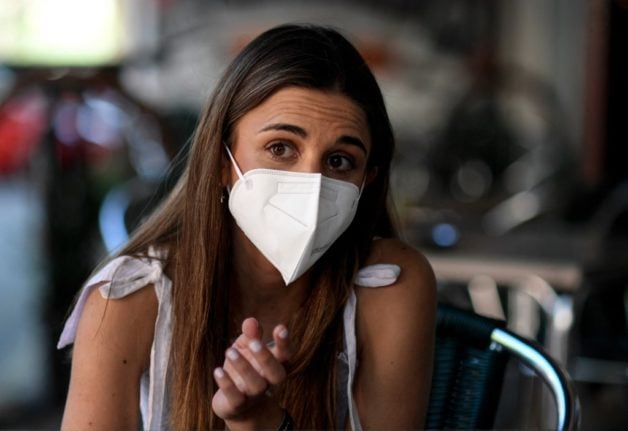After weeks of record infections over the Christmas period and January, the incidence of the highly transmissible Omicron variant dropped considerably throughout February and plateaued in March to the current roughly 450 cases per 100,000 people.
Despite 82 percent of the population being fully vaccinated and half having had a booster shot, Omicron and the sixth wave resulted in 12,000+ deaths in Spain and more than five million cases, which equals more than all infections recorded during all other previous waves.
Fortunately, the pandemic is gradually improving and the Spanish government does want to work towards treating Covid-19 as an endemic disease, as in the case of seasonal influenza, the latest measure being to scrap quarantine for asymptomatic and mild cases from March 28th.
Will there be a seventh wave? Opinions vary among health experts in Spain but there is growing concern by the World Health Organisation that the next stage of the global pandemic will have the Omicron subvariant BA.2 at the centre of it.
It’s been unofficially referred to as the ‘Stealth’ Covid variant or ‘Stealth Omicron’ given that it’s not as easily detectable with standard testing and is reported to be more transmissible than the original dominant BA.1 Omicron variant.
So far it has been detected in at least 80 countries worldwide and it’s become the dominant subvariant in restrictions-free Denmark, the UK as well China, India, Pakistan,the Philippines, and now also Spain.
Will ‘Stealth’ Omicron cause problems in Spain?
According to the latest update by Spain’s Health Emergencies Centre (CCAES), the BA.2 subvariant was now responsible for between 31 and 79 percent of new infections in Spain between March 7th and 13th.
This came after weeks of sequencing carried out in ten regions which showed that BA.2 cases tripled, then quadrupled throughout February.
The original BA.1 subvariant, which just over a month ago accounted for between 79 and 98 percent of cases across the country, has now been replaced as the dominant strain by the BA.2 subvariant.
And we may still not have a clear picture of just how much the subvariant is spreading across Spain given the low rate of sequencing carried out at Spanish laboratories: six percent of tested cases, below the 10 percent recommended by the European Commission.
Spain is following the global trend in rising ‘Stealth’ Omicron cases, with the latest data seeing the World Health Organisation urge countries to keep a close eye on this subvariant.
Scientific studies have so far shown that the BA.2 is 40 percent more transmissible than BA.1, but that the difference isn’t as great as between the Omicron variant as a whole and Delta.
When it comes to how capable ‘Stealth’ Omicron is of causing serious illness or death, the scientific results are more mixed.
“It’s too early to draw conclusions about the characteristics of this strain,” CCAES reported, whilst Spain’s Health Ministry has stated that “so far no differences have been found regarding the risk of hospitalisation between BA.1 and BA.2”.
Lab testing from Japan in February showed that BA.2 may have features that make it as severe as previous variants of Covid, including Delta.
Covid hospitalisations are also up in Denmark and the UK where the subvariant is dominant, but this may be more closely linked to the fact that all Covid restrictions including mask wearing have been dropped in those countries.
Other questions remain, including the risk of reinfection with BA.2 compared to BA.1.
The most common reported symptoms of the ‘Stealth’ subvariant are the same as for the original Omicron subvariant: high temperature, cough, nasal congestion, headache and sore throat.
What could all this mean in practice for the Covid-19 pandemic and restrictions in Spain?
At present not enough is known about ‘Stealth’ Omicron for it to be clear to Spanish health authorities whether it should affect its plan to lift the remaining Covid rules in the coming months.
As of late March, it doesn’t seem that BA.2 is a major concern for health authorities as they have decided to scrap the mandatory seven-day quarantine for asymptomatic and mild Covid cases and to stop counting each and every positive case.
But the government is dragging its feet on the removal of the indoor face mask requirement which Prime Minister Pedro Sánchez promised would happen “very soon”, and the lack of knowledge about the ‘Stealth’ Omicron variant could be one of the reasons behind this.
Spanish health experts are also divided over whether there will be a seventh wave, but the possibility of a “more aggressive variant” is one of the reasons given for there being another spike in Covid cases.
Only a drastic rise in Covid hospitalisations and deaths caused by the subvariant could force them to change their stance.
This pandemic has surprised us before, and no doubt it has the power to do so again, but currently it doesn’t appear that ‘Stealth’ Omicron will change the direction of the pandemic strategy in Spain.
READ ALSO: Will Spain change its domestic and travel Covid rules ahead of Easter?




 Please whitelist us to continue reading.
Please whitelist us to continue reading.
Member comments